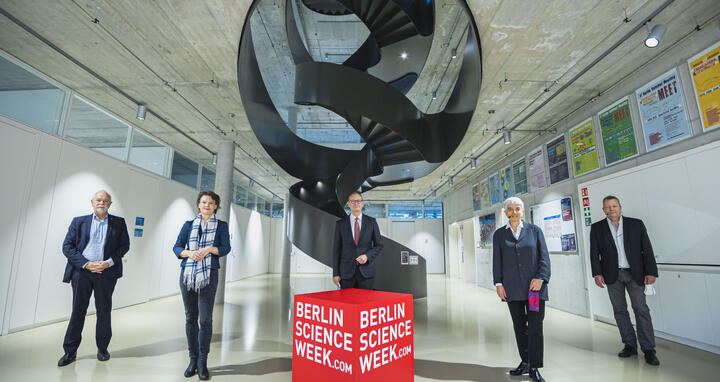📺 That was the Berlin Science Week 2020
Ten days, nearly one virtual event per day, more than a thousand participants, hours of exciting research at the MDC explained: Although the start of this year's Berlin Science Week coincided with the second "lockdown" due to the pandemic, the MDC still offered a program just as interesting and diverse as in the previous years. Here's our look back at some of our events.
STADTMASCHINE KUNST @ MDC meets BERLIN SCIENCE WEEK 2020
The laboratory STADTMASCHINE KUNST @MDC works on improving science communication using visual arts: The complex research contents are to be made visually tangible with the involvement of society. Where are the opportunities, where are the limits of this experiment? What should the STADTMASCHINE KUNST look like in concrete terms so that research, art and society can interact? These questions were the starting point for this digital fishbowl discussion of the initiative STADTMASCHINE KUNST at the Stiftung Zukunft Berlin on November 2, 2020.
German, 104 minutes

Artificial Intelligence, Organoids, Animal Models – new concepts in biomedicine
There is more than one way to explore new therapies for patients. On November 3, 2020, we presented and discussed examples from the MDC research portfolio that combine various strategies and technologies: from artificial intelligence (AI) and omics technologies to organoids and human tissue samples as well as animal models, the 3R principles and clinical research. We introduced our preclinical research center PRC to the public and explained what it has to do with our approach.
German, 118 minutes

Open Science Café
Have you ever heard of Open Science and wondered what it is? Or is there an Open Science topic you wish you knew more about? On November 4, 2020, we invited you to the online Open Science Café. A series of twenty-minute micro-talks and activities about Open Science showed, how we can make research more transparent, more accessible and tangible for everyone. One example is the Citizen-Science-Project "SMOVE" at the MDC, as displayed in the video below.
English, 23 minutes

LifeTime and a future without disease
Is a future without diseases possible? On November 5, 2020, we raised the question what a life without disease would look like – in a future world which had successfully implemented the goals of the LifeTime initiative. LifeTime and The Future Game 2050 asked participating scientists to come up with their own scenarios and solutions on a way to a future without disease. Interviews with LifeTime co-founder Prof. Nikolaus Rajewsky and other experts added to this immersive experience.
English, 40 minutes

Reality-TV – a day in a biomedical lab
On November 6, 2020, we reported live from two of our biomedical labs at the MDC Berlin-Mitte: We shadowed the group of Prof. Markus Landthaler and Prof. Nikolaus Rajewsky, also getting a glimpse of the action in Dr. Jan Philipp Junker's lab. Our scientists explained what they are working on, answered the questions of our viewers in several Q&A sessions and offered career advice – we even played live music in Prof. Uwe Ohler's lab! In other words: just a regular day in a biomedical lab.
German and English, 9 hours

Falling Walls Circle Table: Can cell-based interceptive medicine revolutionize healthcare?
Rudolf Virchow, whose 200th birthday we will celebrate in 2021, made the revolutionary discovery that “diseases are based on disorders of the body’s cells”. The Berlin Charité pathologist first realized that we must understand the inner workings of human cells to diagnose and treat diseases. How right he was, the past decades have shown: we now know that even small alterations in one or a few cells can, following multiple rounds of division and selection, give rise to life threatening diseases such as cancer. Dealing with a complex disease like that is difficult, curing often impossible. If only we recognized the alterations early enough, removing the disoriented cell would be an easy fix. Or maybe we could even push it back to health on its original path? Several internationally renown scientists and clinicians, including BIMS-director Prof. Nikolaus Rajewsky, discussed the opportunities and challenges in a "Falling Walls Circle Table" on November 6, 2020.
English, 67 minutes

Digital Future Medicine Science Match 2020
"The modern molecular methods produce unbelievable amounts of data that no human brain can grasp, let alone analyze by itself. For that, we need artificial intelligence", says Dr. Roland Schwarz. During the Digital Future Medicine Science Match on November 7, 2020, the MDC-researcher chaired the first of many sessions, featuring presentations that explored AI and Basic Medical Research. Roland Schwarz’s lab develops and applies computational methods for understanding tumour heterogeneity and cancer evolution, so he brought together a range of innovative and exciting speakers on the topic. Physicians, health care experts, researchers, politicians, developers, engineers, innovators, industry representatives, entrepreneurs, and investors took part in the event part, which was organized by the Berlin daily newspaper Der Tagesspiegel and the Berlin Institute of Health (BIH).
English, 2:27 hours (entire event)






